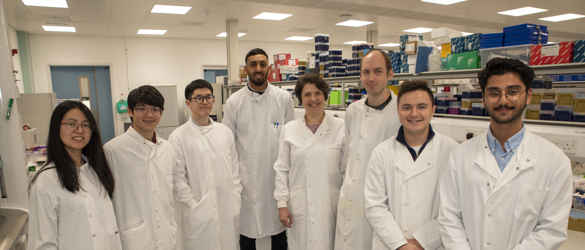Gene editing for Stargardt disease

Professor Robert MacLaren, Oxford University - £119,996
Professor Robert MacLaren and his team will explore a new gene editing approach to correct the fault in the ABCA4 gene that causes Stargardt disease - a rare inherited condition that leads to progressive loss of central vision.
This project aims to repair the faulty gene responsible for the disease and test the technique in specially grown retinal tissue that mimics the human eye. If successful, it could pave the way for the first gene editing treatment for Stargardt, offering hope of protecting or restoring sight in the future.
What is the problem?
Stargardt disease is caused by a mutation in the ABCA4 gene, which results in a faulty ABCA4 protein. The faulty protein means the cells do not work as they should, leading to degeneration of the macula and sight loss. Symptoms of Stargardt disease are seen in people with two copies of this mutated gene - just a single correct version of the gene will create enough protein to enable the macula to function properly.
What are they doing?
Gene editing is a new technique that enables adaptations to be made to the nucleotide sequence of DNA - either by cutting them out, replacing them or swapping them around. The first stage of this project will see the Stargardt mutation corrected in this way.
The team will then work on introducing their gene editing system into a retinal organoid. These are special tissues grown in the laboratory which have the same complex structure as the human retina, including the light-sensitive photoreceptor layer. To introduce new genes into cells, a modified virus is used as the vector (means of transmission).
The potential impact
By successfully repairing the faulty ABCA4 gene in retinal tissue, this research could provide the vital first step towards developing a gene editing therapy for Stargardt disease.
If proven effective, the same two-phase approach could one day be tested in clinical trials - and potentially open up new treatment possibilities for other inherited macular conditions.
See our other projects
Since 1987 the Macular Society has invested around £10 million in over 100 research projects.
Explore more research
Beating macular disease through funding medical research and improving the lives of those living with macular disease.
Get the latest research news from the Macular Society
To hear about life-changing research and treatments, subscribe to our monthly enewsletter today. Together we can Beat Macular Disease.
Sign up to our free email newsletter



